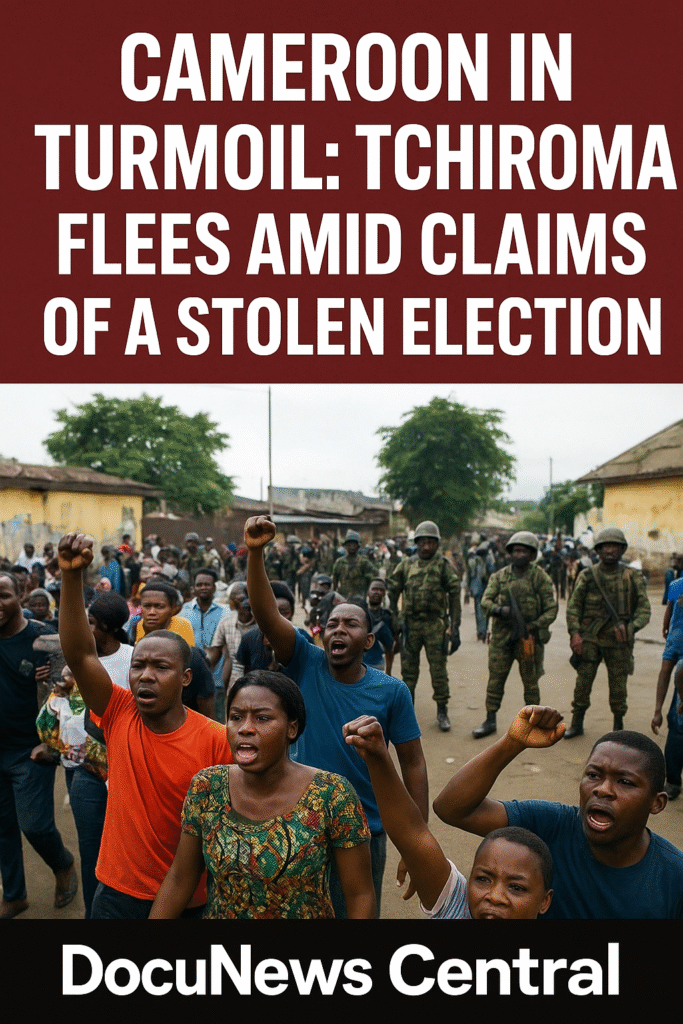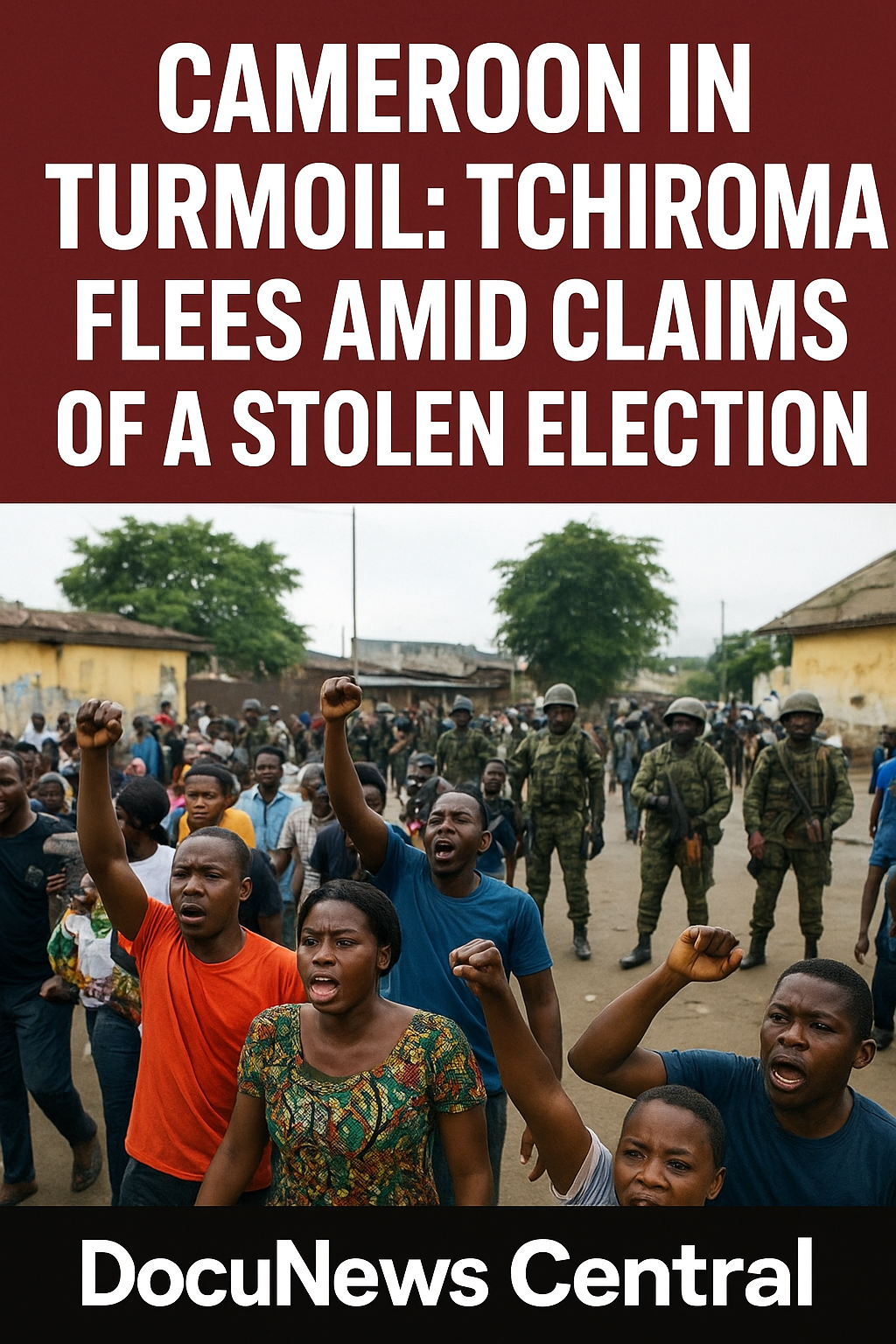By DocuNews Central — Published October 31, 2025

Cameroon is once again at the center of a political storm following its highly contested 2025 presidential election. What started as a democratic process has spiraled into a national crisis, pitting the ruling establishment of President Paul Biya against the self-declared president-elect, Issa Tchiroma Bakary.
Tchiroma’s sudden disappearance — reportedly fleeing the country amid rising post-election tension — has left millions anxious about the nation’s future. As reports circulate of his possible exile and allegations of electoral fraud grow louder, the Cameroon election crisis 2025 is shaping up to be a defining moment in Central African politics.
Read also: African Elections Under Scrutiny: The Battle for Democracy in 2025
The Election That Sparked a Storm
The 2025 election was supposed to mark democratic renewal in Cameroon — a chance to transition leadership after more than four decades under Paul Biya, now 95 years old and still serving as the world’s oldest head of state. Despite his age, Biya ran again under the Cameroon People’s Democratic Movement (CPDM) banner.
Meanwhile, his main rival, Issa Tchiroma Bakary, once a government spokesperson, presented himself as the voice of a generation yearning for change. The opposition’s message resonated strongly, especially in northern regions and English-speaking areas long marginalized by the central government.
Initially, the polls appeared peaceful, but as counting dragged on and results became inconsistent, observers began raising concerns. Eventually, the Constitutional Council declared Biya the winner with 53.66%, sparking outrage among opposition supporters.
Tchiroma rejected the results, calling them “a betrayal of democracy” and demanded an independent audit. However, his challenge was swiftly dismissed by the electoral body — a move that triggered waves of protest across major cities.
The Self-Declaration and Sudden Disappearance
On October 26, 2025, Tchiroma dramatically declared himself “the legitimate president of Cameroon.” He cited “overwhelming evidence” of ghost polling stations and tampered ballots.
Within hours, reports surfaced that security forces surrounded his home in Garoua. But before dawn, he had vanished. Opposition aides claimed that loyal soldiers had escorted him to safety, while unverified sources said he had crossed into Nigeria or Niger.
Although the government denied any knowledge of his whereabouts, tension soared. Protests erupted in Yaoundé, Douala, and Bamenda, where citizens marched with placards reading “Tchiroma our president!” Security forces responded with tear gas, and several arrests followed.
The disappearance of the opposition leader deepened public confusion, feeding into the narrative that the Cameroon election crisis 2025 was far from over.
Paul Biya’s Silence and Growing Unrest
President Biya remained silent for days. Eventually, his office released a brief statement urging calm and respect for the Constitutional Council’s decision. Yet, his silence was widely interpreted as indifference.
Behind the scenes, ruling party members demanded decisive action against “those destabilizing national unity.” However, the heavy-handed security response — including internet restrictions — only fueled public anger.
For many observers, Biya’s leadership style appears increasingly detached. His administration’s attempts to contain the situation through censorship and military deployment have only intensified international scrutiny.
Regional and International Reactions
The crisis has drawn swift reactions from across Africa. The African Union (AU) and Economic Community of Central African States (ECCAS) both called for restraint and dialogue.
Neighboring countries such as Nigeria and Chad expressed concern about potential refugee inflows. Meanwhile, France, the United States, and the United Kingdom urged transparency and respect for human rights.
Although Niger officially denied harboring Tchiroma, diplomatic sources confirmed that regional talks are ongoing to prevent further destabilization.
International human rights organizations, including Amnesty International, have called for the immediate release of protesters and an end to arbitrary detentions. Their statements emphasize that peace cannot exist without justice — a reminder that the Cameroon election crisis 2025 has implications far beyond its borders.
A Cycle of Power and Protest
For many Cameroonians, the current crisis feels familiar. Since the 1990s, nearly every election under Biya has been marred by allegations of rigging and suppression. Nevertheless, Biya’s control over state institutions has kept him in power.
Tchiroma’s candidacy disrupted that pattern. His campaign resonated with youth frustrated by high unemployment and persistent inequality. Moreover, his northern origin and political experience gave him credibility among diverse ethnic groups.
You may also like: The Rise of Opposition Movements in Central Africa
The Military’s Position
The stance of Cameroon’s military could determine the nation’s future. Historically loyal to Biya, the army now faces internal pressure. Younger officers, especially from the north, reportedly sympathize with the opposition’s cause.
Despite speculation about divisions, there is no verified evidence of an organized military movement in support of Tchiroma. Analysts, however, warn that if mistrust continues, cracks could appear within the security establishment — something that might destabilize the entire region.
Meanwhile, the risk of confrontation grows higher each day, though most citizens still cling to hope for peace.
Media Clampdown and the Fight for Information
Following the disputed results, the government imposed restrictions on Facebook, X (Twitter), and WhatsApp. Officials claimed it was to prevent misinformation, but critics saw it as an attempt to silence dissent.
Independent journalists have faced harassment and equipment seizures. Several media outlets sympathetic to the opposition were suspended. This information blackout has created a dangerous space where rumors thrive and truth becomes fragmented.
International media houses — including Reuters, the BBC, and The Guardian — now rely heavily on satellite reporting and diaspora sources to cover the story. As misinformation circulates online, digital literacy and access to credible news become vital for the public.
Cameroon’s Future: Between Dialogue and Division
At this point, it’s clear that Cameroon stands at a crossroads. Diplomats from ECCAS and the AU are pushing for peace talks between the Biya administration and opposition representatives.
Many experts suggest that inclusive national dialogue — involving political leaders, civil society, and faith-based organizations — could defuse the crisis. However, time is running out.
If both sides continue trading accusations, Cameroon’s fragile stability might crumble, affecting trade and security across Central Africa. Therefore, the coming weeks are crucial in shaping not just the political outcome, but the country’s long-term peace.
Conclusion
The Cameroon election crisis 2025 exposes the tension between entrenched power and a population demanding democratic change. Paul Biya’s long rule symbolizes continuity, but also fatigue. Tchiroma’s defiance has ignited a sense of hope — and risk.
For lasting peace, both leaders must prioritize dialogue over division. Cameroonians deserve transparency, justice, and a future that reflects the will of the people. In the end, the world is watching. Whether Cameroon restores faith in its democracy or descends further into unrest will depend on how its leaders — and citizens — choose to act today.
Tags: Cameroon election, Paul Biya, Issa Tchiroma, African politics, Cameroon news
Suggested internal posts for linking (replace with real permalinks):
- African Elections Under Scrutiny: The Battle for Democracy in 2025
- The Rise of Opposition Movements in Central Africa












Thank you for your sharing. I am worried that I lack creative ideas. It is your article that makes me full of hope. Thank you. But, I have a question, can you help me? https://accounts.binance.info/zh-CN/register-person?ref=WFZUU6SI
Your article helped me a lot, is there any more related content? Thanks! https://www.binance.com/en/register?ref=JHQQKNKN